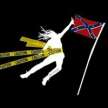Hunter S. Thompson
The Father of Gonzo Journalism

He was the father of what is known as gonzo journalism. His raw, seething reports of what he witnessed and experienced left nothing to the imagination. He made you feel as if you were there with him. He sadly committed suicide on February 20, 2005. This world was much stranger than anything he could have wrote, and finally he caved in under the pressure of his own genius.
He was known for his heavy use of drugs and alcohol. He had ridden with the Hells Angels, gone to Puerto Rico, ridden the campaign trail, and he also ran for Sherriff of Pitkin County, Colorado on the freak power ticket where he was narrowly defeated. His life was not one of apathy or indifference. He often stated, as in his book Fear and Loathing on the Campaign Trail ’72, his disdain and hatred of Richard Nixon. He often had a reputation of a troublemaker and had contempt of authoritarianism. One of his famous quotes is “I hate to advocate drugs, alcohol, violence, or insanity, but they have always worked for me.”
He had originally joined the Air Force, but was given an honorable discharge after it was recommended that while talented, he would not be guided by policy. This is how he seemed to live his life. He frequently worked with Ralph Steadman, who did the illustrations for his books. His first piece of gonzo journalism was titled "The Kentucky Derby is Decadent and Depraved." The meaning behind gonzo journalism is a manic first person subjectivity of a story that blurs the lines of fiction and nonfiction. This became his writing style as he claimed it for his own. The idea of gonzo was first published in his book, Fear and Loathing in Las Vegas.
He would often call himself Raoul Duke in his writing memoirs, who was an erratic, self-destructive journalist who frequently imbibed alcohol and hallucinogenic drugs. He once said in an interview that he felt pressured to live up to this character that he had created. He was never sure who people wanted him to be when he was invited to speak as the legend of Raoul Duke became bigger and weirder. He gained a cult following in literary as well as drug circles.
He was a major supporter of drug legalization as well as the Industrial Workers of the World. He often wrote on the behalf of African-Americans, and the civil rights movement. He often criticized the dominance in American society, calling it “the White power structure."
As I stated earlier, he tragically committed suicide at his home known as Owl Creek Farm, in Colorado. His writing went downhill as well as his health, and he could no longer stand it. He once admitted to a friend that if it weren’t for suicide, he would feel trapped in this world. He left a suicide note which was titled “Football Season Is Over.”
“No more games. No more bombs. No more walking. No more fun. No more swimming. 67. That’s 17 years past 50. 17 more than I needed or wanted. Boring. I am always bitchy. No fun- for anybody. 67. You are getting greedy. Act your age. Relax, this won’t hurt a bit.” –"Football Season is Over" by Hunter S. Thompson
His friend and cohort Ralph Steadman said, “If you wonder if he has gone to Heaven or Hell, rest assured he will check them out both, find out which one Richard Nixon went to and go there. He could never stand being bored. But there must be football too—and peacocks.”
On August 20, 2005 a private funeral was held for him. He went out the way he wanted. His ashes were fired from a cannon, which was placed atop a 153-foot tower that was the shape of a double-thumbed fist holding a peyote button. This was the symbol he used when he running for election. It cost 3 million dollars to do, and was funded by Johnny Depp. Over 280 people attended including senators, celebrities, musicians, and friends.
Unfortunately, I did not get into his literature until after his passing, but I recommend it to anyone who wants to go on a wild ride through politics and society. He definitely takes you along for the ride.
About the Creator
James Howell
Father, activist, man in black... He/Him






Comments
There are no comments for this story
Be the first to respond and start the conversation.